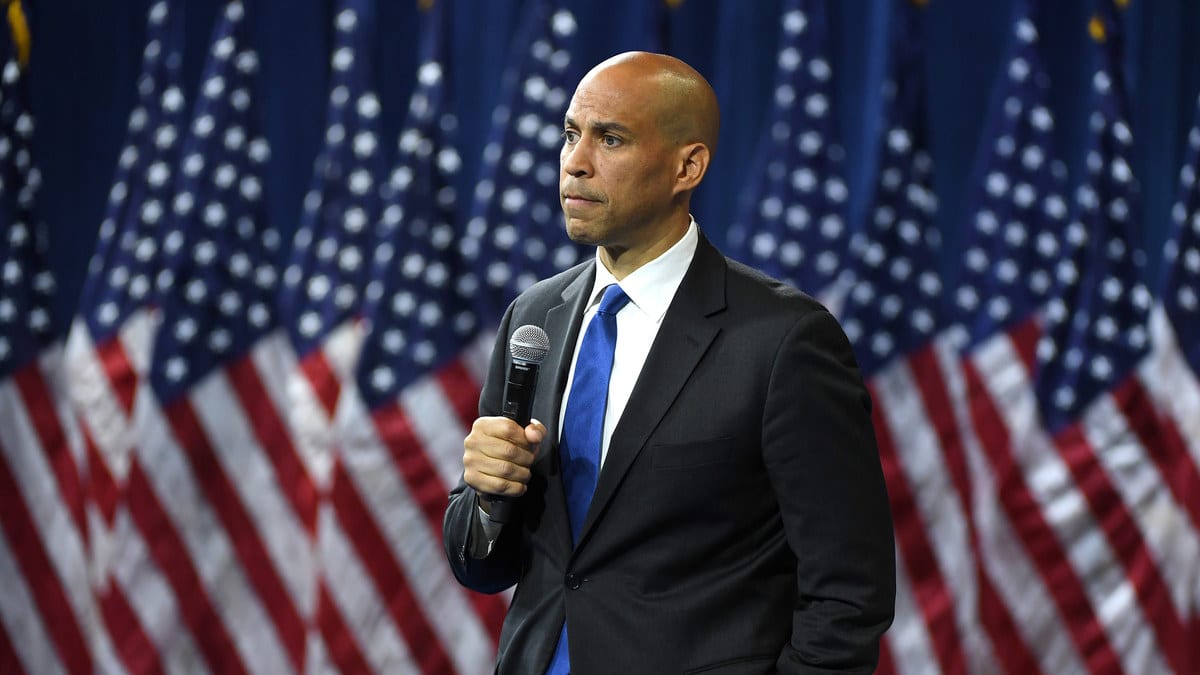Choosing to live in a crime-stressed neighborhood in Newark, the city New Jersey Sen. Cory Booker once led as mayor, gives him a perspective that America sorely needs at this time. As rioters and looters turned peaceful protests into nights of chaos and violence, Booker tweeted, “My team right now is drafting legislation to achieve better transparency and accountability into police misconduct in this country. We know what we need to do—now we need to manifest a collective will to get it done.”
It was 5:57 a.m. Sunday morning, a weekend from hell, and the congenitally energetic Booker would soon be on CNN talking about the need for a national registry of cops who have been terminated for misconduct, or had complaints brought against them, so problem officers can’t easily get hired in another jurisdiction.
Derek Chauvin, the Minneapolis cop charged in the death of George Floyd, had 18 conduct complaints brought against him in his 19-year career. Booker’s registry wouldn’t address the systemic toleration that allowed an officer so compromised to remain on street duty. But another proposed reform would get at what drives the anger behind the protests—that a police officer who committed such a heinous act of murder in broad daylight with everyone watching would be charged only with third-degree murder.
The legislation that Booker is readying would alter Section 242, the federal statute governing police misconduct, to change the intention standard from “willfulness standard” to “recklessness standard.” To win a first-degree murder charge, a prosecutor would have to prove that Chauvin had willful intention that he sought to kill Floyd, a very high bar that is rarely met in the world of policing.
The three pillars of Booker’s reform package call for police accountability, more data, and more training. He would ban choke holds and restrict no-knock warrants of the kind that led to the tragic death of Breonna Taylor, who was asleep in her own home in Louisville, Kentucky, when the cops barged in.
Booker would change the “qualified immunity doctrine” in federal law so that victims of police misconduct would no longer be barred from recovering damages in the form of financial remuneration when police violate their constitutional rights.
The core of the proposed legislation is its call for data to lift the curtain of secrecy around police procedures. “It is really stunning in this day and age that there is no federal reporting on state and local statistics on law enforcement use of force,” an aide to Booker told The Daily Beast. “They receive money from the federal government, and they’re not reporting data about when force is being used, and demographic data on who that force is being used against.”
An investigation in 2018 of 72,677 use-of-force reports in New Jersey by NJ Advance Media for NJ.com found that 38 percent were brought by 10 percent of the officers. “You can imagine if we have this data nationwide what we will learn,” says the Booker aide.
Ed Chung, a former prosecutor who works on criminal justice reform at the Center for American Progress, supports Booker’s effort but cautions, “If we can get that information, great, but we’re going to get a lot of pushback.”
On a call with civil rights leaders Monday, Sherrilyn Ifill of the NAACP Legal Defense Fund invoked President Obama’s Task Force on 21st Century Policing, a seminal work that she said is “gathering dust” on a shelf at the Department of Justice. “There’s no confusion about what we want,” she said. “We have been talking about this ad nauseam for the last five years.”
Now’s the time for action, and Booker has the zeal of a convert. He wasn’t always on the side of progressive reform. He won the Newark mayor’s race in 2006–his second try–on a platform of zero tolerance policing, promising to prosecute even the most minor infractions while boosting social services to the most challenged communities.
Crime fell, but grievances mounted against the police for racial profiling, harassing minorities with unwarranted stops, and finally and most telling, the use of excessive force. When the ACLU petitioned the Department of Justice to intervene in 2010, Booker argued the outside interference was “one of the worst ways” to bring about meaningful change. “We don’t need people who are going to frustrate, undermine and mischaracterize our agency.”
Booker had his eyes opened and his consciousness raised by the ACLU, and he would later say he was “relieved and enthusiastic” about working with the DOJ to address the allegations brought by the ACLU. Times changed, and in the new era of Black Lives Matter, Booker is in the forefront in the U.S. Senate pushing for progressive criminal justice reforms.
If there’s anything surprising about his turnaround, it’s why it didn’t happen sooner. When Booker was graduating from Stanford in 1992, he wrote a column describing how he felt after a jury acquitted Rodney King’s assailants, four police officers, setting off violent protests in Los Angeles. “I’m a black man. I am 6 feet 3 inches tall and 230 pounds, just like King. Do I scare you? Am I a threat? Does your fear justify your actions? Twelve people believed it did.”
He also recounted how police had recently stopped him near the George Washington Bridge that connects New Jersey and New York. “Five police cars, six officers, surround my car, guns ready,” he wrote. “I sat shaking.” Once cleared, he was told that he had fit the description of a car thief. No black person, however accomplished, is immune from the racism that lingers in the air like an invisible dust, Kareem Abdul-Jabbar wrote this week.
I was in Atlanta in 1968 when Martin Luther King, Jr. was assassinated in Memphis by a white man. Newsweek sent the four of us in the Atlanta bureau gas masks in anticipation of the city erupting in riots. We didn’t need them. Mine is still in the basement as a reminder of that time.
The city’s progressive white mayor, Ivan Allen, led the way in a police car for the nearly 4,000 black students from the city’s historically black colleges to march through the neighborhoods. A decade earlier, Allen had run a failed race for governor on a segregationist platform. "I wasn't so all-fired liberal when I first moved into City Hall," he wrote in his book, Notes on the Sixties. “But when I saw what the race-baiters were doing or could do to hold back the orderly growth of Atlanta, it infuriated me and eventually swung me to the extreme end opposite them.”
Two years earlier, in 1966, attempting to quell a riot in a black neighborhood, Allen climbed on a police car to talk to the crowd, only to be toppled to the ground as the protesters rocked the vehicle. Uninjured and undeterred, he walked the streets without a riot helmet urging his black constituents to “please go home,” and shouting, “This is a good city. Help keep it that way, and go home.”
Peace prevailed under his leadership. it was “the city too busy to hate.” Other cities didn’t fare so well, and Richard Nixon galvanized the grievances and the fear felt by whites to win the White House. Then as now the peaceful protests were hijacked by the more extreme elements, and the politics were seized by one side. An election shaping up to be a referendum on Trump’s handling of the coronavirus could turn into a choice of leadership on race, America’s original sin. From knee to knee, from Colin Kaepernick to George Floyd, America is now at another decision point. There is no more margin for error.

